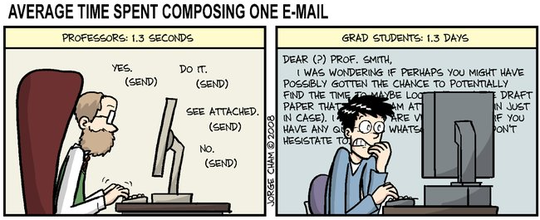The Worst They Can Say Is No

Overcoming Social Anxiety with an Attitude Change
Going into college I had a serious case of social anxiety. From conversations with classmates, I know I wasn’t the only one suffering from this problem, although everyone’s fears took different forms. My anxiety manifested itself whenever I had to start a conversation either in person or online. A typical example occurred when I would need to email professors to apply for a research position or just to ask for help. Every time, I would spend a few agonizing hours composing the ideal paragraph only to receive a reply within minutes saying simply “Yes” with the tag “Sent from my iPhone.” Inevitably, I would brief a sigh of relief and tell myself next time I would remember the professor would only spend a few seconds on my email and it did not have to be perfect. I knew that whenever I would read an email, I did not analyze every word and others were not expecting immaculate messages. Nevertheless, the next time I had to write a dreaded email, I would forget my promise and waste precious time crafting a message. Debilitating social stumbling blocks such as this affect all of us to some degree because we have a natural aversion to situations where we might be subjected to social disapproval. This makes perfect sense from an evolutionary standpoint — we would not want to be alienated from a group when we depend on them for survival — but it does not serve us well in the modern world where we must expose ourselves to rejection in multiple interactions every day. Even though one of my goals after high school was to embrace failure rather than trying to avoid it, I knew that social anxiety led me to avoid trying new opportunities because I was afraid of any form of rejection. Although I was able to identify this condition before my freshman year, it was not until my junior year that I was able to overcome it by embracing the mindset of “the worst they can say is no.”
This attitude is best illustrated with a personal example. My junior year, I had a thermodynamics class with a particularly stubborn professor. A former astronaut in training (he trained for 2 years as a back-up but never flew), he was known to spend an entire lecture discussing the intricacies of sailing because some topic, say surface friction, had reminded him of a decades-old experience. He would then end the lecture by assigning homework and telling us that since he was out of time, we would just have to refer to the book to learn any topics he was supposed to have covered. His first day message was: “I am not here to teach you, because you should learn everything on your own from the book while doing homework.” This is not unusual for a college course, but there was a slight catch in this particular class. The book that the professor was referring to had gone out of print 5 years beforehand and only a few used copies were offered on Amazon starting at $500. Moreover, there was no ebook that could be acquired, even through questionably legal methods. While several students shelled out the money for the book in the hope that they would be able to sell it at the end of the semester, I balked at the price. Even after the professor was told was this book was nearly impossible to obtain, he refused to change the textbook and said simply “share one book with five people. That’s $100 each. That’s the price of a pair of shoes except the book is more useful.”
After looking through every resource available (friends, the library, the entire Internet), I decided to put the motto of “the worst they can say is no” into practice. I searched for the author of the book, found his school email, and sent him a message explaining the situation and asking if it would be possible for him to sell a digital copy of his book. My reasoning was that surely the book had been digitally designed and it would have to be relatively easy to make it available for purchase. A few hours after hitting send, I received the completely unexpected but welcome reply: “Send me your address and I will have a copy of the book in the mail tomorrow.” I offered to at least pay for the shipping, but I could not convince the author to accept any money. All he wanted was a promise I would not sell the book after the semester. I assured him that it would be passed on through several years of engineers (assuming that the professor would never change his ways). A few days later, the book showed up in the mail with a nice message from the author. After I put it through its paces, it is currently in the hands of another engineer about to take the same class, with the same professor, using the same book.
 Note from the Author: “Will, either keep for your library or pass it on.”
Note from the Author: “Will, either keep for your library or pass it on.”
This story serves not to brag about my ability to talk my way into a free book, but to demonstrate the effectiveness of “the worst they can say is no” mentality. Before putting this attitude into practice, I would never have done something as crazy as emailing an unknown professor asking for a copy of his book, even though it took only 5 minutes of my time and saved me hundreds of dollars. My anxiety would have been too great and prevented me from hitting send. I won’t guarantee that this particular application will work every time (although to be honest I’ve only tried it once) but the general principle that you might as well ask has been a game-changer in my college career. Since this exchange, I no longer agonize over emails to professors (I do still check for spelling though) and I have improved at applying the same concept in person. Anytime I am presented with an opportunity that holds a chance for rejection, I remind myself that the worst case scenario is simply “no.” Even receiving a no can be a chance to improve one’s self if it is followed up with the question “What can I do better next time?”
Applying for a job, trying for a raise, or contacting a professor for help can seem intimidating, but there is no consequence to asking, and not asking could be a major source of regret. I look back on many chances I have missed , but there are very few experiences that I have agreed to that I would take back. Memorizing a saying like “the worst they can say is no” will never solve your problems, but it can serve as that extra confidence needed to get you to hit the send button or start a conversation. This outlook is particularly relevant to those students heading back to college because you will be exposed to more opportunities than at any other point in your life and you will need to constantly reach out for advice. Although from an evolutionary viewpoint, our inclination to hesitate in social situations could have served us well, that does not mean that we have to accept the default response (xenophobia may be natural, but we should still do everything in our power to combat it). Although some traits may have benefited us in the past, we need to realize that we can suppress harmful innate (or learned) responses and develop more sensible reactions for modern conditions. “The worst they can say is no” is an effective message that can be used to overcome natural social anxieties and anyone heading off to college or hesitating when applying for a new opportunity should embrace this attitude change.